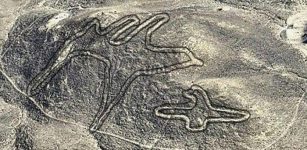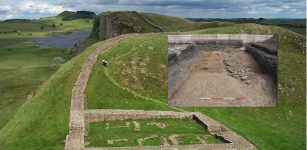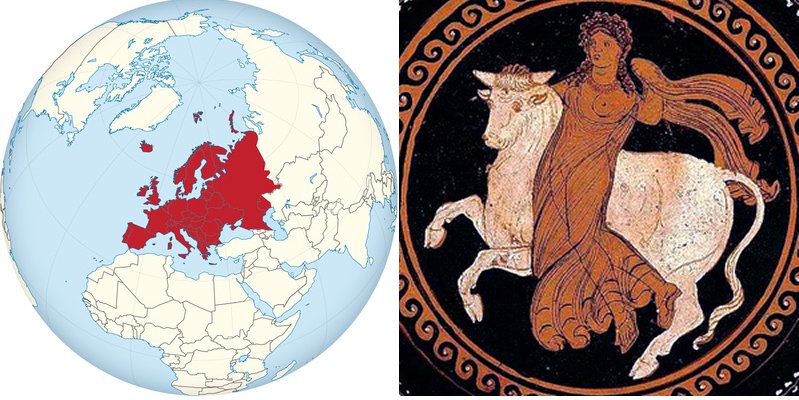Why Is Europe Called Europe?
AncientPages.com - We are all familiar with the names of the continents and their geographic location, but not everyone knows the history behind these names.
If you are a European, you do not spend much time contemplating on your continent's name and if you are living in another part of the world, you simply take for granted that Europe is - yes, Europe.
But when and how did we name the continent Europe? A possible answer to this question can be found in the history of ancient Greece.
About 700 B.C. it was common to refer to the mainland of Greece as Europe.
The word Europe is derived from the Greek words "eurys" and "ops". "Eurys", which means "broad" and was a religious synonym for the Earth and "ops" means "face". Europe means thus "face of Earth".
At that time, Greek religion was influenced by the religions of the Middle East in which the Earth played a vital role in fertility worship.
See also:
How Greenland Got The ‘Wrong’ Name Thanks To Viking Erik The Red
Chocolate Was Invented In Mesoamerica 1900 B.C.
About 500 B.C., the northern parts of Greece were generally referred to as Europe and soon thereafter the name was applied not only to Greece, but to the whole continent.
According to another theory, promoted by many researchers, the word Europe comes from the Semitic word "erebu", which means "sunset". This is because when we look from a Middle Eastern viewpoint, the Sun sets over Europe.
In the same way one could say that the name Asia comes from the word "asu", which means "sunrise".
Additionally, in Greek mythology, Europa was a Phoenician princess who was abducted by the god Zeus disguised as a bull.
She was taken to Crete where she later gave birth to Minos who became the King of Crete.
Copyright © AncientPages.com This material may not be published, broadcast, rewritten or redistributed in whole or part without the express written permission of AncientPages.com
Expand for referencesReferences:
Various books and magazines
More From Ancient Pages
-
 Ancient Temple Dedicated To Aztec God Xipe Totec Discovered In Mexico Reveals A Gruesome Story
Archaeology | Jan 21, 2019
Ancient Temple Dedicated To Aztec God Xipe Totec Discovered In Mexico Reveals A Gruesome Story
Archaeology | Jan 21, 2019 -
 Children’s Toys Among Roman-Era Artifacts Unearthed At Ancient City Of Beçin Turkey
Artifacts | Oct 14, 2020
Children’s Toys Among Roman-Era Artifacts Unearthed At Ancient City Of Beçin Turkey
Artifacts | Oct 14, 2020 -
 Nasca Lines: Researchers Identify 16 Bird Geoglyphs Drawn On Desert Plains Of Peru
Archaeology | Jun 23, 2019
Nasca Lines: Researchers Identify 16 Bird Geoglyphs Drawn On Desert Plains Of Peru
Archaeology | Jun 23, 2019 -
 Vedic God Indra: Ruler Of Heavens And Tough Warrior Who Kills Evil Serpent Vritra
Featured Stories | Feb 1, 2019
Vedic God Indra: Ruler Of Heavens And Tough Warrior Who Kills Evil Serpent Vritra
Featured Stories | Feb 1, 2019 -
 Ancient DNA Reveals Mongolia’s First Nomadic Empire Was Multiethnic
DNA | Apr 14, 2023
Ancient DNA Reveals Mongolia’s First Nomadic Empire Was Multiethnic
DNA | Apr 14, 2023 -
 5,000-Year-Old Black Death Victim Challenges Theories Of Development Of Human Civilization
Archaeology | Jul 1, 2021
5,000-Year-Old Black Death Victim Challenges Theories Of Development Of Human Civilization
Archaeology | Jul 1, 2021 -
 Flower Of Life: Ancient Sacred Geometry Symbol And Blueprint Of The Universe
Ancient Symbols | Oct 8, 2017
Flower Of Life: Ancient Sacred Geometry Symbol And Blueprint Of The Universe
Ancient Symbols | Oct 8, 2017 -
 ‘Ali Baba Cave’ Treasures: Burial Boxes Inscribed With Jesus’ Name May Help Reconstruct Jesus’ Life And Death
Archaeology | Mar 21, 2017
‘Ali Baba Cave’ Treasures: Burial Boxes Inscribed With Jesus’ Name May Help Reconstruct Jesus’ Life And Death
Archaeology | Mar 21, 2017 -
 Did Richard The Lionheart Order Assassins To Kill Conrad Of Montferrat, King Of Jerusalem?
Featured Stories | Dec 27, 2018
Did Richard The Lionheart Order Assassins To Kill Conrad Of Montferrat, King Of Jerusalem?
Featured Stories | Dec 27, 2018 -
 Neanderthals Used Amlash Caves In Iran’s Gilan Province As Shelters
Archaeology | Aug 19, 2020
Neanderthals Used Amlash Caves In Iran’s Gilan Province As Shelters
Archaeology | Aug 19, 2020 -
 Mysterious Ancient Village In A Prehistoric Anomalous Zone – Dangerous Underground Secret – Part 2
Ancient Mysteries | Jul 28, 2020
Mysterious Ancient Village In A Prehistoric Anomalous Zone – Dangerous Underground Secret – Part 2
Ancient Mysteries | Jul 28, 2020 -
 Strange History Of Safety Coffins: From Ancient To Modern Times
Featured Stories | Feb 9, 2016
Strange History Of Safety Coffins: From Ancient To Modern Times
Featured Stories | Feb 9, 2016 -
 Remnants Of A Royal Rest House That Served As A Temporary Residence For Pharaoh Thutmose III
Archaeology | May 9, 2024
Remnants Of A Royal Rest House That Served As A Temporary Residence For Pharaoh Thutmose III
Archaeology | May 9, 2024 -
 Fantastic Discovery At Hadrian’s Wall Reported By Archaeologists
Archaeology | Sep 10, 2022
Fantastic Discovery At Hadrian’s Wall Reported By Archaeologists
Archaeology | Sep 10, 2022 -
 Ancient Jaintia Kingdom And The Garden Of Monoliths And Dolmens
Featured Stories | Nov 8, 2016
Ancient Jaintia Kingdom And The Garden Of Monoliths And Dolmens
Featured Stories | Nov 8, 2016 -
 On This Day In History: Edict Of Longjumeau Was Signed And Ended Second War of Religion – On Mar 23, 1568
News | Mar 23, 2017
On This Day In History: Edict Of Longjumeau Was Signed And Ended Second War of Religion – On Mar 23, 1568
News | Mar 23, 2017 -
 Pax Romana: 200-Year-Long Period Of Stability Within The Roman Empire
Ancient History Facts | Apr 19, 2016
Pax Romana: 200-Year-Long Period Of Stability Within The Roman Empire
Ancient History Facts | Apr 19, 2016 -
 Curse Of Evil Eye: Powerful Ancient Belief That Still Frightens People Around The World
Featured Stories | May 9, 2017
Curse Of Evil Eye: Powerful Ancient Belief That Still Frightens People Around The World
Featured Stories | May 9, 2017 -
 Indigenous People Of Ancient Sicily Were Acrive Traders Long Before The Greeks Arrived
Archaeology | Sep 28, 2021
Indigenous People Of Ancient Sicily Were Acrive Traders Long Before The Greeks Arrived
Archaeology | Sep 28, 2021 -
 Ancient Manuscript In Museum Reveals Discovery Of Objects Unknown To Modern Science – Coptic Secrets And Guardians Of Treasures – Part 2
Ancient Mysteries | Apr 11, 2021
Ancient Manuscript In Museum Reveals Discovery Of Objects Unknown To Modern Science – Coptic Secrets And Guardians Of Treasures – Part 2
Ancient Mysteries | Apr 11, 2021


